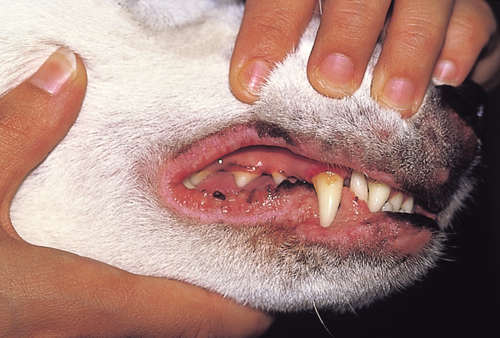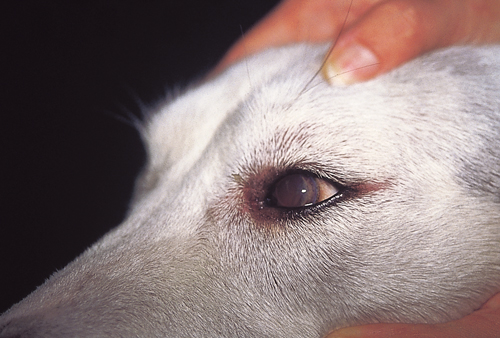Difference between revisions of "Small Animal Dermatology Q&A 18"
Ggaitskell (talk | contribs) |
|||
| Line 15: | Line 15: | ||
*It is believed to be caused by autoantibodies against melanin, gangliosides, and photoreceptors. | *It is believed to be caused by autoantibodies against melanin, gangliosides, and photoreceptors. | ||
*There is no age or sex predilection, but breeds such as akitas, chow chows, samoyeds, and Siberian huskies appear to be predisposed. | *There is no age or sex predilection, but breeds such as akitas, chow chows, samoyeds, and Siberian huskies appear to be predisposed. | ||
| − | |l1= | + | |l1=Canine Uveodermatologic Syndrome |
|q2= | |q2= | ||
What would the dermatological and ophthalmic examinations be looking for? | What would the dermatological and ophthalmic examinations be looking for? | ||
| Line 31: | Line 31: | ||
*glaucoma. <br> | *glaucoma. <br> | ||
If left untreated, these dogs may develop blindness. | If left untreated, these dogs may develop blindness. | ||
| − | |l2= | + | |l2=Canine Uveodermatologic Syndrome#Diagnosis |
|q3=How should this disease be managed? | |q3=How should this disease be managed? | ||
|a3= | |a3= | ||
| Line 41: | Line 41: | ||
*The skin lesions may respond to therapy but should not be used as an indicator of remission. | *The skin lesions may respond to therapy but should not be used as an indicator of remission. | ||
*Dogs may have active ocular lesions even though the skin lesions are static or have repigmented. | *Dogs may have active ocular lesions even though the skin lesions are static or have repigmented. | ||
| − | |l3= | + | |l3=Canine Uveodermatologic Syndrome#Treatment |
</FlashCard> | </FlashCard> | ||
Latest revision as of 13:12, 1 August 2011
| This question was provided by Manson Publishing as part of the OVAL Project. See more small animal dermatological questions |
A 2-year-old male Siberian husky dog was presented for depigmentation of the lips. Closer examination revealed he was photophobic and had areas of depigmentation on the margins of the eyelid. The dog had difficulty navigating in the examination room, but the owner was not aware of any visual problems until the examination.
| Question | Answer | Article | |
| What is the most likely diagnosis? | Canine uveodermatologic syndrome.
|
Link to Article | |
|
What would the dermatological and ophthalmic examinations be looking for? |
The disease is characterized by depigmentation of the skin and acute concurrent uveitis. Depigmentation may occur on the nose, lips, eyelids, footpads, scrotum, prepuce, anus, and hard palate.
If left untreated, these dogs may develop blindness. |
Link to Article | |
| How should this disease be managed? | The skin lesions usually develop within 7–10 days of the ocular lesions; however, the owner is more likely to notice the depigmentation first.
|
Link to Article | |

